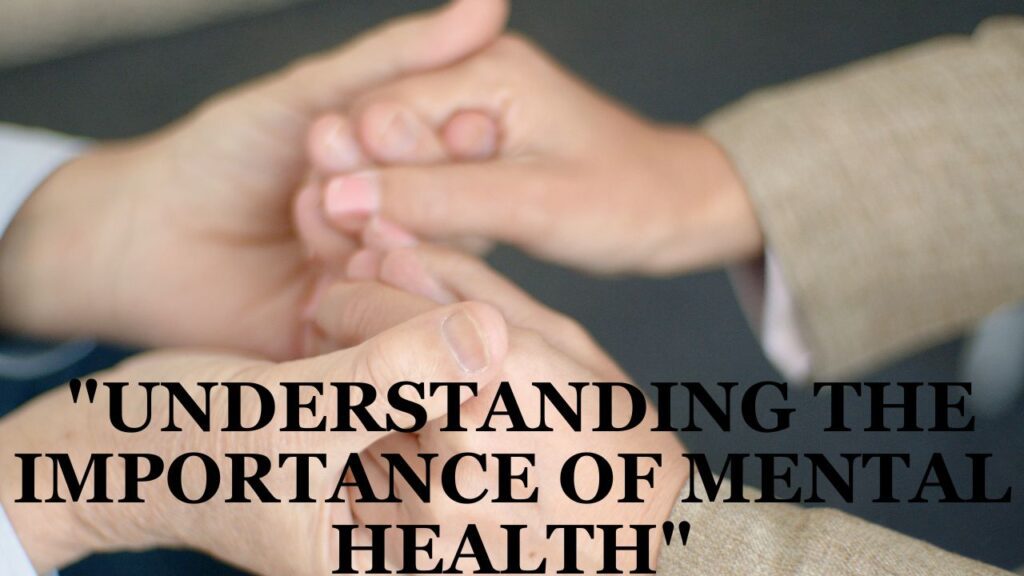Introduction:
Understanding the importance of Mental Health in the whirlwind of our lives, it is easy to forget that mental wellness can be pushed in the background, being neglected by the pressures of work, relationships, and social expectations. However, awareness about mental health has increased exponentially over the past few years, leading to changes in attitudes towards acknowledging and addressing issues related to mental wellbeing. This article aims to dive into the multiple aspects of mental health, examining its importance, the factors that affect it, and the consequences of not taking care. By understanding the complexities that surround mental wellbeing, we will help to create an empathetic and compassionate society.
Understanding the Importance of Mental Health
Mental health refers to psychological, emotional, as well as social well-being. It affects the way people think, feel, and behave. It is a state of flux that is subject to change depending on a variety of factors, including the experiences of life, genetics, and the influences of the environment. Contrary to what many people believe, mental health is not simply an absence or lack of illness but rather the presence of positive characteristics such as resilience, coping strategies, and a sense of emotional well-being.
The Interconnected Web of Factors
Numerous factors affect the delicate mental health balance. Biological elements, like brain chemistry and genetics, have a major impact on an individual’s vulnerability to mental health issues. Factors that affect the environment, such as trauma and experiences from childhood and socio-economic status, can influence the mental health of an individual. Furthermore, decisions in the way of life, such as eating habits, exercise routines, and alcohol consumption, influence these factors and create a web that affects the health of a person’s mind.
The Stigma Surrounding Mental Health
Despite increased awareness, stigma is still an obstacle to acknowledging and confronting mental health concerns. Social attitudes can perpetuate falsehoods and myths that lead to discrimination and disconnection for people who have mental health issues. The stigma may prevent people from seeking assistance, thereby aggravates their condition as well as perpetuating the cycle of isolation and misery.
Implications of Ignoring Mental Health
The neglect of mental health can have far-reaching effects on individuals as well as on society at large. Mental health problems can hinder the quality of life, which can affect one’s ability to work as well as maintain relationships and live life to the fullest. The financial burden of untreated mental health issues is huge, which can lead to a loss of productivity as well as increased healthcare costs and stress on social services.
Additionally, the relationship between physical and mental health is undisputed. Inadequate treatment for mental health issues can cause physical health issues to worsen as well, which underscores the necessity of an integrated approach to health. Neglecting mental health issues is not just detrimental to the lives of individuals but also puts a strain on healthcare systems and social structures.
Promoting Mental Health
An active approach to mental wellness includes not just treating mental illness but also creating a positive environment that promotes wellbeing. Awareness and education campaigns play a significant role in eradicating stigma and encouraging dialogue concerning mental illness. Employer initiatives that emphasize mental health, like employee assistance programs as well as stress management tools, can contribute to better health for the workforce.
On a personal level, mindfulness, self-care, and seeking out professional assistance in times of need are vital aspects of maintaining a healthy mental state. Integrating mental health education into the curriculum of schools will equip children with the skills to navigate their mental health and build resilience right from the beginning.
The Role of Community and Social Support
Social networks and communities can be vital pillars for helping to improve mental health. A sense of belonging and trust within the community provides people with a security net through difficult times. Friendships that are supportive, whether with family members, friends, or community groups, provide emotional support and practical help, decreasing the loneliness that is often a result of depression and anxiety.

The Impact on Global Well-Being
The vitality of mental health isn’t restricted to individual or community scales; it’s an imperative for all of us. The World Health Organization (WHO) recognizes that mental health is an integral aspect of overall health and stresses the necessity of international engagement in mental health initiatives. As the world becomes more interconnected, addressing mental health issues at a global level is essential for sustainable development, increasing resilience among communities, and lessening the stress on healthcare systems.
Challenges and Opportunities
Although there has been progress in acknowledging that mental health is important, difficulties persist in implementing a wide-ranging change. The lack of access to services for mental health, especially in areas that are underserved, creates an obstacle for people seeking assistance. The dearth of mental health specialists and the varying levels of insurance coverage further exacerbate the problem, resulting in many people not having the resources needed to treat them.
In addition, cultural norms and expectations can prevent people from recognizing and taking care of their mental health concerns. Initiatives to promote cultural competency in the field of mental health that consider different beliefs and values are vital to creating an inclusive and efficient support system.
In the midst of these challenges, there are opportunities for advocacy and innovation. Technology integration in mental health services, such as the telehealth platform and apps for mental health, could help bridge access gaps. Virtual therapy sessions as well as online tools are geared towards people who are unable to access services due to physical or logistical obstacles to traditional mental health services.
Additionally, advocacy efforts at legislative levels could result in policies that are more geared towards mental health. A greater amount of funds for research into mental health as well as the development of programs that are based on community involvement and the expansion of mental health insurance coverage in the health policy are essential steps towards an equal mental health system.
The Link Between Mental Health and Productivity
In the workplace, the connection between productivity and mental health is becoming more evident. Employers are becoming aware that encouraging mental health in the workplace is not just beneficial to the health of their employees but can also boost overall productivity. Engagement, creativity, and satisfaction at work are all linked to well-being in the mind.
Initiatives like flexible working schedules, mental health days, and programs to reduce stress can help create a positive work culture. Furthermore, de-stigmatizing discussions about mental health within the workplace can encourage employees to seek assistance whenever needed, creating a culture that is tolerant and compassionate.
Making investments in the mental health of employees does not just reduce absenteeism and turnover but also enhances the reputation of the company as an ethical and compassionate employer. As business practices change, it is becoming more commonplace to incorporate mental health programs into corporate strategies, which is now an integral part of modern and sustainable businesses.
Preventive Mental Health Measures
Prevention is essential to keeping mental health in check and reducing the incidence of mental health problems. Prevention and early intervention strategies can help reduce the negative effects of stressors, life issues, and other stresses and prevent the progression of symptoms that are mild into more serious conditions.
Awareness and education programs focused on resilience-building, stress management, and coping techniques enable individuals to take proactive measures towards ensuring their mental wellbeing. Integrating assessments for mental health into routine health check-ups could aid in the early detection of potential problems, which allows for prompt intervention and assistance.

The Role of Education in Mental Health
Education plays an integral part in shaping attitudes and behaviors towards mental health. The integration of mental health awareness into the curriculum of schools does more than provide students with the ability to manage and understand their mental health; it also helps them develop compassion and empathy for those around them.
Educational institutions must be able to create an environment of support that recognizes the challenges students face and offers support for dealing with them. Counseling services, as well as peer support programs and awareness campaigns for mental health within the educational setting, contribute to an environment in which getting help is the norm and accepted.
The Role of Media in Shaping Mental Health Narratives
The media play a crucial role in influencing the perceptions of society and attitudes toward mental health. An accurate and responsible representation in a variety of media is a significant factor in decreasing stigma and increasing understanding. However, sensationalized portrayals of mental health problems can perpetuate misconceptions and stereotypes, which further marginalize people suffering from mental illness.
Television films, television, and social media can be effective in raising awareness and starting discussions on mental health. Public service campaigns and advocacy announcements that tell authentic stories and stress recovery and resilience are essential to reducing stigma around mental health issues. Collaborations between media outlets as well as mental health experts will ensure that representations are respectful and add positively to the public’s debate.
Global Perspectives on Mental Health
Mental health issues are a global issue that transcends the boundaries of geography, culture, and socioeconomic borders. Although the manifestation of mental health problems may differ in different cultures, the basic need for understanding, care, and access to care for mental illness is constant.
In many areas of the world, different cultural norms and practices affect the perception of mental health. The advocacy for awareness of mental health needs to be culturally sensitive, taking into account different beliefs and working in partnership with local communities in order to come up with specific solutions. International initiatives that emphasize mental health as an individual right and promote fair and equitable access to services related to mental health aid in creating a more diverse and compassionate society.
Emerging Trends in Mental Health Research
The advancements in research into mental health have opened new avenues for diagnosing and treating mental health problems. Research in neuroscience is uncovering the complex connections between the brain’s function and mental health, which is resulting in new treatments and medicines. Furthermore, epigenetics is helping to understand how environmental factors influence gene expression linked to mental health. This research provides information on prevention and customized treatments.
Digital mental health treatments, including VR therapy on smartphones, apps for mobile phones, and online support communities, are now integral to the mental health system. These tools improve accessibility, allowing people to get help and resources at the convenience of their own homes. But ethical concerns and privacy concerns regarding data and the need for rigorous confirmation remain vital elements of the integration of technology into the field of mental health.

The Impact of Socioeconomic Factors on Mental Health
Socioeconomic factors have a significant impact on mental health outcomes. Inequality of income, lack of accessibility to educational and work opportunities, and insufficient social support systems cause differences in the field of mental health. The solution to these social determinants is vital to creating an environment that encourages the mental health of everyone, regardless of their economic situation.
Policies that focus on the welfare of society, low-cost housing, and comprehensive health coverage can significantly decrease the effects of socioeconomic factors in relation to mental wellbeing. In addition, encouraging an environment of social cohesion and community can help protect against the negative effects of economic difficulties.
Looking Ahead: A Holistic Approach to Mental Health
As we explore the many complexities of the 21st century, it’s evident that understanding the significance of mental health requires a broad and holistic approach. This includes addressing not only your own well-being but also social, cultural, and systemic factors that affect mental health outcomes.
The future of advocacy for mental health is in the collaborative efforts that connect people, communities, health professionals, policymakers, and the media. Promoting education about mental health and reducing stigma, as well as increasing the availability of affordable and culturally appropriate healthcare for mental illness, are key actions to create a society in which mental well-being is a top priority for all.
The journey to better understand and prioritize mental health is constantly evolving, multifaceted, is interconnected with many elements of our daily lives. By encouraging a global discussion about the latest developments in technology and research and tackling the socioeconomic factors that impact mental health, we can all work together to create an empathetic, resilient, inclusive, and tolerant world in which mental health isn’t only a secondary concern but rather the foundation of human flourishing.
Conclusion
Recognizing the significance of health for mental wellbeing is a constant process that requires a joint effort from communities, individuals, and institutions. By tackling the issues by embracing opportunities and infusing mental health into all aspects of our lives, we can create an environment that values and encourages well-being for all.
In the current environment, it is imperative to reduce the stigmatization of mental illness. The expansion of accessibility to services as well as an increase in proactive measures are crucial. Understanding the synergy between mental health and productivity at work, both in the workplace and in more general social settings, emphasizes the need to implement broad-based strategies that emphasize the interdependence between individual well-being and the development of our society.
As we continue to move forward and continue to fight for the world to be one that places mental health as more than only a matter of importance but rather the foundation on which people as well as nations can flourish, the process of knowing and respecting the importance of mental wellbeing is a shared responsibility that is the foundation for an even more caring, healthy, resilient, and prosperous future for all of us.
Check out the link and watch your own brain health fail. You can feel it, but you can’t stop it.







